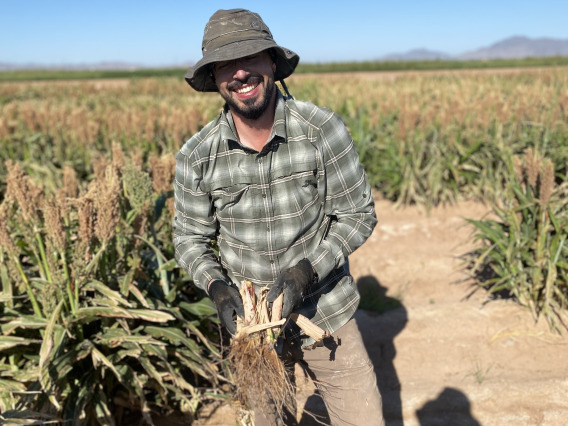B.S. in Plant Sciences
You can help solve some of our planet's greatest challenges -- from food and energy security to environmental and human health -- with a bachelor’s degree in plant sciences.
Our program prepares you to tackle real-world problems through classroom knowledge and hands-on training in laboratory, field and industrial settings. You’ll be equipped with the confidence and expertise to enter post-graduate studies or careers in molecular biology and plant breeding research, with applications in medicine, pharmacy, microbiology, agriculture and more.
Why major in plant sciences?
You want to turn your passion for the environment and for meeting the challenges of population growth and climate change into a rewarding career. In the plant sciences program, you’ll work side-by-side with some of the world’s leading plant scientists and learn how to apply your knowledge to careers in fundamental and practical research aimed at improving crops, plant health and agricultural sustainability.
A degree in plant sciences prepares you for careers in food production, renewable energy, medicine, agriculture and manufacturing. It also serves as a springboard for graduate school. According to the U.S. Bureau of Labor Statistics, the median pay for careers related to agricultural and food science was $76,400 per year with faster-than-average job growth overall (2023).
There are a variety of career opportunities available to students who complete a B.S. in plant sciences, including:
- Research assistant/technician: Perform research or other laboratory tasks under the supervision of a senior scientist in plant breeding, propagation or pest control companies, or in academic, institutional or government research laboratories.
- Agronomist: Manage soil and field crop production, conduct research, and develop new crop hybrids and varieties.
- Ecologist: Collect, study and report data on the quality of food, soil and water.
- Plant pathologist: Research and work to understand plant responses to pests to design strategies for pest management.
- Plant breeder: Develop crops adapted to arid and semi-arid environments.
As a plant sciences student, you’ll gain knowledge and skills in genomics, molecular biology, metabolic engineering, and other modern approaches to 21st-century agriculture. Required courses are subject to change. Meet with your advisor regularly to review your course plan.
Plant sciences students have the unique opportunity to gain fundamental and practical experience in the classroom, lab and field with courses like the following:
| Animal and Plant Genetics | Plant Biology |
| Plant Cell Structure and Function | Biochemistry |
| Plant Growth and Physiology | Introductory Plant Pathology |
Program emphases
Our program lets you choose from a plant sciences general emphasis and a plant health sciences emphasis to build a degree that fits your plan.


